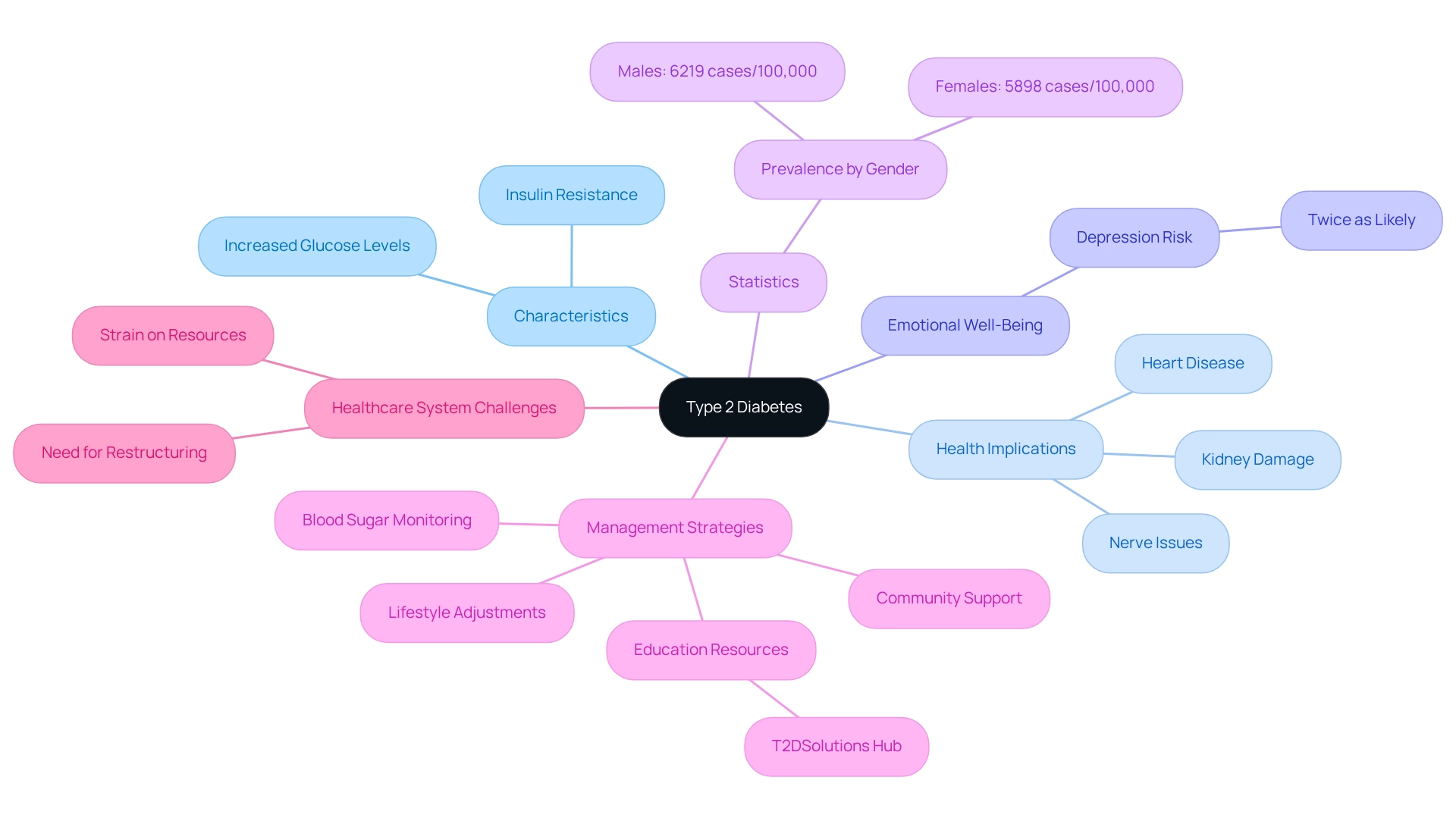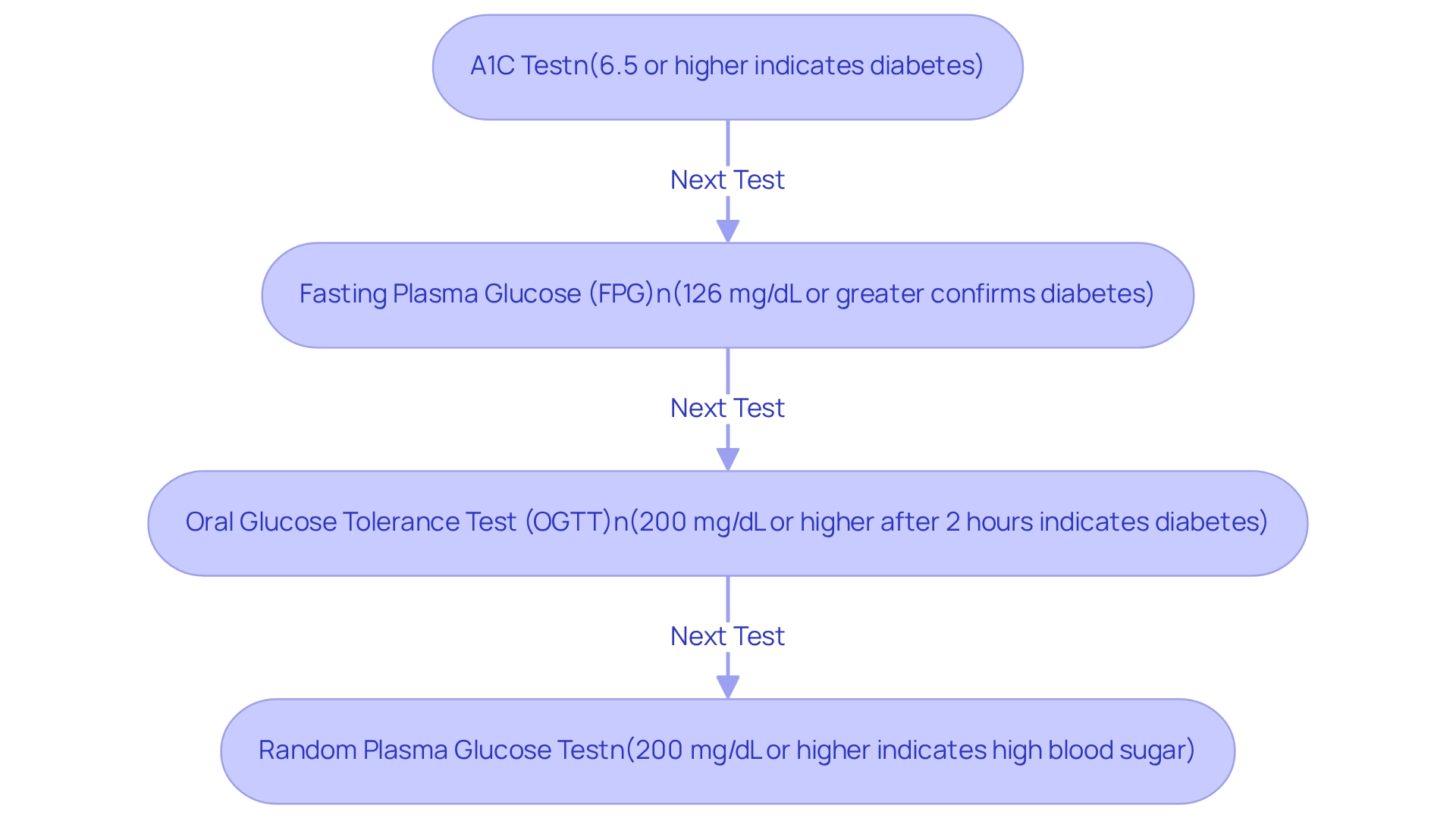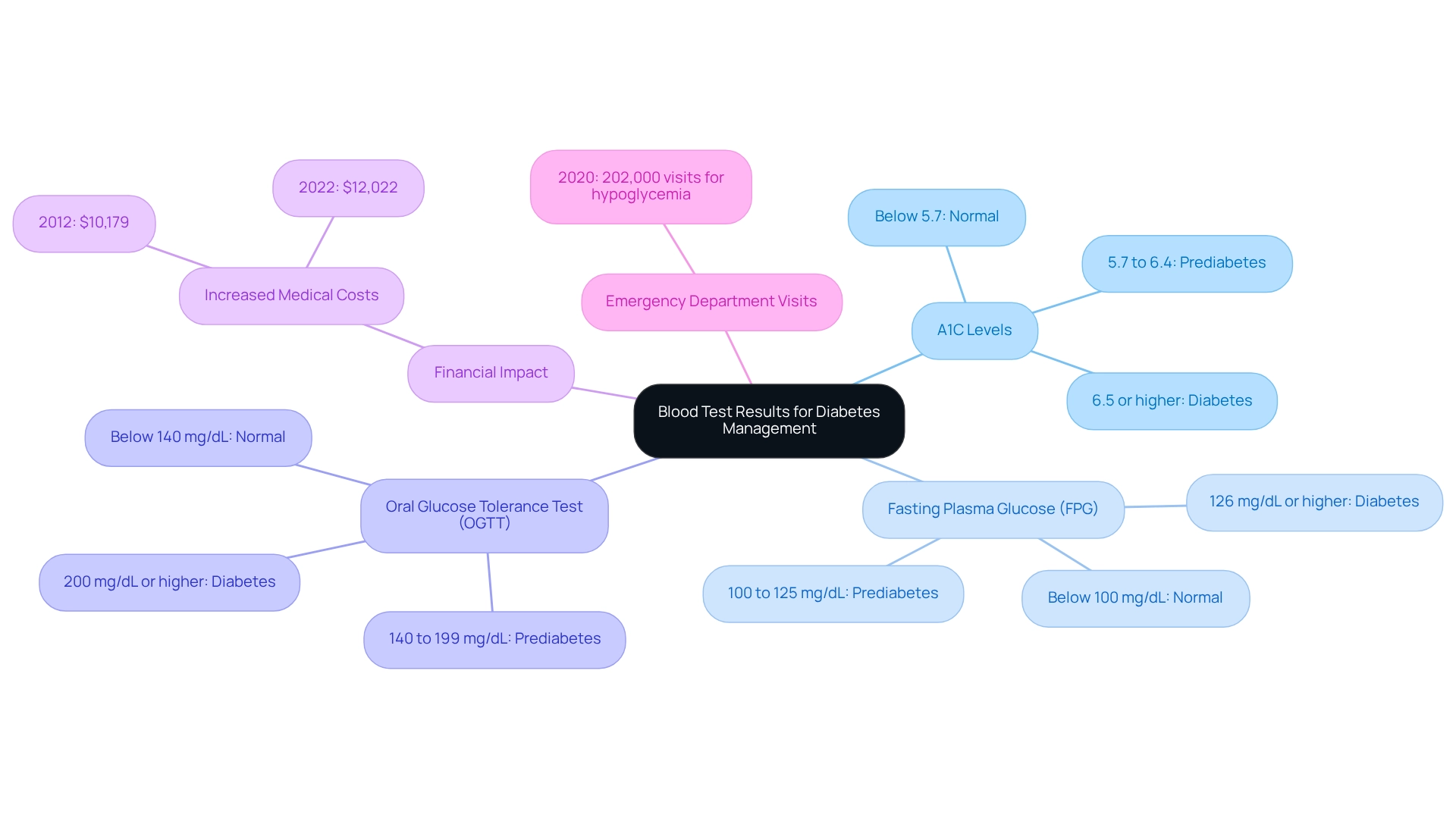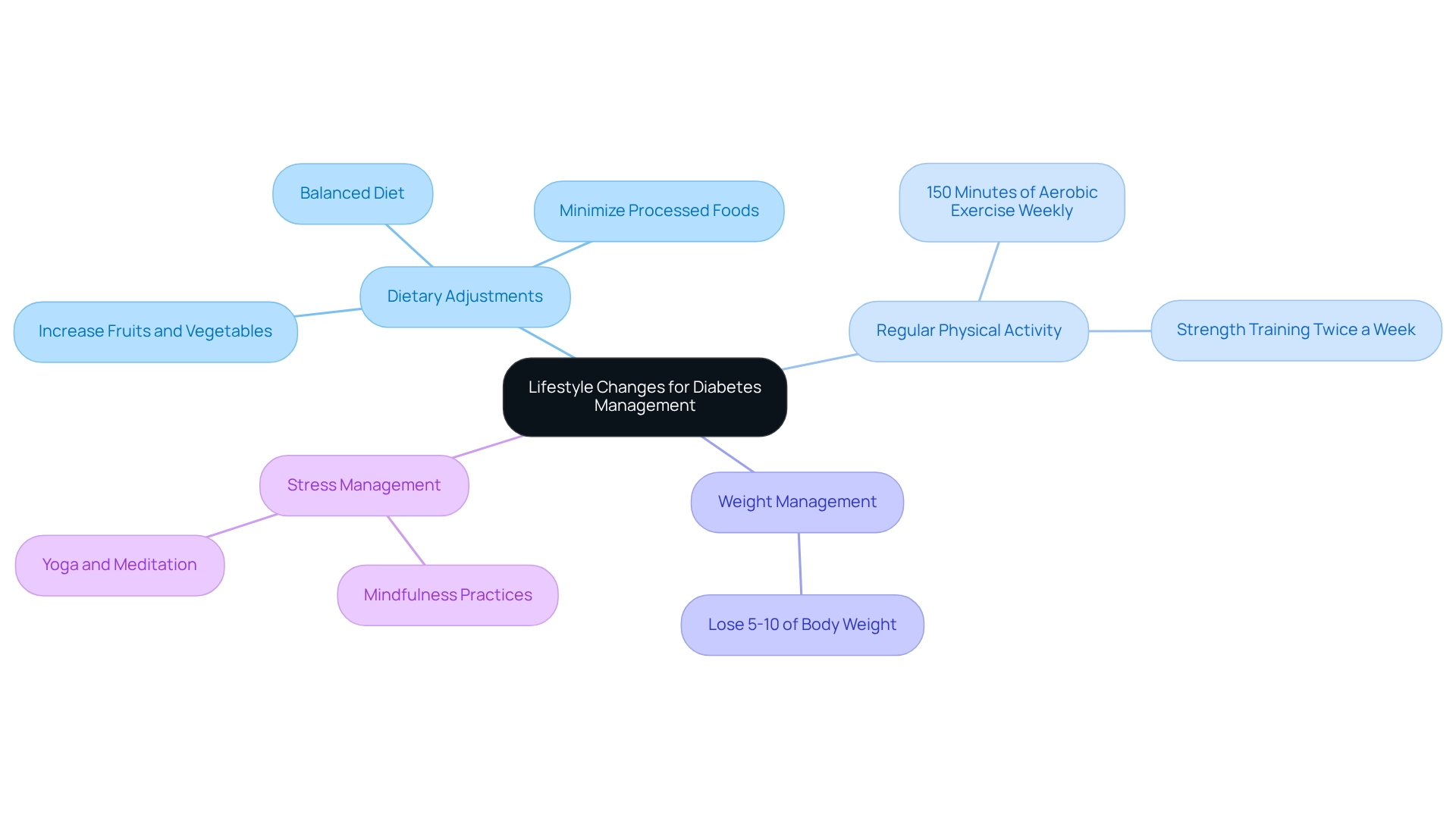Overview
This article aims to help you understand the results of type 2 diabetes blood tests and the lifestyle changes that can make a meaningful difference in managing your condition. It’s important to know that interpreting blood test results, like A1C and fasting plasma glucose levels, is essential for guiding your treatment and lifestyle modifications. Proactive management can significantly improve your health outcomes and reduce the risk of complications associated with diabetes.
You might be feeling overwhelmed, and that’s completely understandable. Knowing your numbers can empower you, providing a clearer picture of your health. This understanding can lead to positive changes in your daily life, helping you to feel more in control. Remember, you’re not alone in this journey; many have walked this path and found ways to thrive.
As you navigate this journey, consider reaching out for support. There are resources available to help you interpret these results and make informed decisions about your health. Together, we can create a plan that works for you, ensuring you have the tools and knowledge to manage your diabetes effectively. We are here to support you every step of the way.
Introduction
In a world where chronic conditions like Type 2 Diabetes are increasingly prevalent, understanding this complex disease is more crucial than ever. Characterized by insulin resistance and elevated blood sugar levels, Type 2 Diabetes poses serious health risks, including heart disease and kidney damage. It also impacts emotional well-being, often leading to higher rates of depression among those affected. It's understandable to feel overwhelmed by these statistics, especially since they reveal a notable prevalence among males. This highlights the importance of targeted education and resources for effective management.
As T2DSolutions emerges as a vital resource hub, it seeks to empower patients through comprehensive education and community support. You're not alone in this journey. This article delves into the intricacies of Type 2 Diabetes, exploring its implications, essential blood tests for diagnosis and management, and the lifestyle changes that can significantly enhance health outcomes. Together, we can navigate this path toward better health.
Define Type 2 Diabetes and Its Implications
Type 2 Diabetes is a long-lasting condition characterized by insulin resistance, meaning the body struggles to use insulin effectively. This can lead to increased glucose levels and serious health complications, such as heart disease, kidney damage, and nerve issues. Understanding Type 2 Diabetes is crucial for patients; it empowers them to take control of their health through informed decisions about the type 2 diabetes blood test, blood sugar monitoring, and lifestyle adjustments.
The implications of this condition reach beyond physical health, affecting emotional well-being and overall quality of life. It's understandable to feel overwhelmed by this diagnosis. According to the CDC, "Individuals with this condition are twice as likely to experience depression as those without it," highlighting the importance of comprehensive management strategies that address both physical and mental health needs.
Current statistics reveal a higher prevalence of Type 2 Diabetes among males, with 6,219 cases per 100,000 compared to 5,898 cases per 100,000 in females. This disparity underscores the need for targeted education and resources tailored to different demographics, ensuring that all individuals receive the support they need.
As T2DSolutions launches as a new resource hub for Type 2 and Type 3 blood sugar management education, it aims to empower patients with comprehensive resources and community support. Expert opinions emphasize the necessity of understanding Type 2 Diabetes not only for effective management but also for improving quality of life. Case studies, such as the one titled "Healthcare System Challenges Due to Diabetes," illustrate the challenges faced by healthcare systems due to the rising number of diabetes cases, particularly in populous countries like China and India, where current hospital-based management strategies are becoming unsustainable.
Practical instances of insulin resistance, like the impact of lifestyle choices on glucose concentrations, further demonstrate its health consequences. This emphasizes the significance of proactive management and community assistance in navigating the complexities of this condition. Remember, you're not alone in this journey; we are here to support you every step of the way.

Explore Key Blood Tests for Type 2 Diabetes
Explore Key Blood Tests for Type 2 Diabetes
If you or a loved one is navigating the journey of Type 2 Diabetes, understanding the key blood tests is essential for effective management and care. Here are some important tests that can help you on this path:
-
A1C Test: This examination assesses your average glucose levels over the past two to three months. If your A1C measurement is 6.5% or higher, it indicates diabetes. As Peter M. House wisely states, "Diabetes is not a burden, but a lesson in perseverance and self-care." This highlights the importance of understanding and managing your condition with compassion and care.
-
Fasting Plasma Glucose (FPG): This test measures your blood sugar after fasting for at least eight hours. A result of 126 mg/dL or greater confirms diabetes. Many individuals find that elevated FPG levels often lead to lifestyle changes and medication adjustments, which can feel overwhelming. Remember, you are not alone in this journey.
-
Oral Glucose Tolerance Test (OGTT): After fasting, you'll drink a glucose solution, and your blood sugar will be tested. A reading of 200 mg/dL or higher after two hours indicates diabetes. This test is also beneficial for identifying prediabetes, where A1C values range from 5.7% to 6.4%. It's understandable to feel concerned about these numbers, but knowledge is power.
-
Random Plasma Glucose Test: This test measures your blood sugar at any time, regardless of when you last ate. A level of 200 mg/dL or higher indicates high blood sugar. This test is often used in urgent situations or when symptoms are present, providing quick insights into your health.
Regular testing is crucial for monitoring your treatment and making necessary adjustments. It's important to know that individuals with Type 2 Diabetes are twice as likely to experience depression. This emphasizes the need for holistic care that includes mental health support along with routine glucose monitoring. By understanding the type 2 diabetes blood test and its implications, you can take proactive steps to effectively manage your condition.
As part of this journey, T2DSolutions offers valuable resources, including the Essential Diabetes Book, to support your education and community engagement. Remember, we are here to support you every step of the way.

Interpret Blood Test Results and Their Impact on Management
Interpreting the type 2 diabetes blood test results is crucial for effectively managing your condition. Let’s break down some key tests and what they mean for you:
-
A1C Levels:
- Below 5.7%: Normal
- 5.7% to 6.4%: Prediabetes
- 6.5% or higher: Diabetes
-
Fasting Plasma Glucose (FPG):
- Below 100 mg/dL: Normal
- 100 to 125 mg/dL: Prediabetes
- 126 mg/dL or higher: Diabetes
-
Oral Glucose Tolerance Test (OGTT):
- Below 140 mg/dL: Normal
- 140 to 199 mg/dL: Prediabetes
- 200 mg/dL or higher: Diabetes
Understanding these results enables you and your healthcare provider to make informed decisions regarding treatment plans, lifestyle modifications, and monitoring strategies. For instance, a high A1C level may prompt a reassessment of your dietary habits and medication adherence, while lower levels can indicate effective management.
Statistics show that medical expenses related to your condition have notably increased, from $10,179 to $12,022 per individual between 2012 and 2022. This highlights the importance of proactive management. The financial strain of the condition makes it crucial for you to comprehend your type 2 diabetes blood test results and take suitable measures. In 2020, there were 202,000 emergency department visits for hypoglycemia among adults with blood sugar issues, emphasizing the critical need for better monitoring and education to prevent such incidents.
Real-world examples illustrate how Fasting Plasma Glucose results can directly impact treatment decisions. For example, if your FPG is 130 mg/dL, you may be advised to adopt a more stringent dietary plan and enhance physical activity to prevent progression to the disease.
Expert interpretations emphasize that A1C and FPG results are not just numbers; they reflect the effectiveness of your management strategies and can guide necessary adjustments to improve your health outcomes. As one educator noted, "Understanding your blood test results is the first step in taking control of your health management." By understanding these metrics, you can take charge of your health management journey. Remember, you're not alone in this journey. For additional assistance and resources, T2DSolutions is here to help you navigate your condition management effectively.

Implement Lifestyle Changes Based on Blood Test Insights
Making lifestyle adjustments guided by insights from a type 2 diabetes blood test can greatly improve diabetes management:
-
Dietary Adjustments: Emphasizing a balanced diet that includes whole grains, lean proteins, healthy fats, and an abundance of fruits and vegetables is essential. Minimizing processed foods and sweeteners is crucial for stabilizing glucose concentrations. Research shows that dietary modifications can lead to better glucose management, with many individuals observing considerable decreases in their glucose readings after adopting healthier eating practices.
-
Regular Physical Activity: Striving for at least 150 minutes of moderate aerobic exercise weekly, complemented by strength training on two days, can make a significant difference. Consistent physical activity not only improves insulin sensitivity but also helps in reducing glucose levels. Many individuals who integrate regular physical activity into their routines frequently observe significant enhancements in their glucose management.
-
Weight Management: Even modest weight loss can lead to improved glucose regulation and a reduced risk of complications. Research emphasizes that losing only 5-10% of body weight can significantly influence the management of blood sugar levels.
-
Stress Management: Engaging in stress-reducing practices such as mindfulness, yoga, or meditation is vital. It's understandable to feel overwhelmed, and stress has been shown to negatively influence glucose measurements. Including relaxation methods in your daily routine can be incredibly beneficial, particularly for individuals who need to prepare for a type 2 diabetes blood test, as regular monitoring of glucose levels is essential for understanding how lifestyle changes impact health management. This proactive approach enables individuals to make well-informed modifications to their routines.
In the context of the prevalence of diabetes, the median county-level incidence of diagnosed cases was 9.0 per 1,000 people in 2020. This statistic underscores the significance of these lifestyle changes for many individuals. Furthermore, in 2020, there were 202,000 emergency department visits for hypoglycemia among adults with high blood sugar, highlighting the critical need for effective blood glucose management. Projections indicate that by 2050, 1 in 8 adults will be living with diabetes, amounting to approximately 853 million individuals. This emphasizes the urgency of adopting these lifestyle changes.
By embracing these lifestyle adjustments, you can take significant steps toward improved health and potentially lessen your dependence on medication. Remember, you're not alone in this journey; we are here to support you every step of the way.

Conclusion
Type 2 Diabetes is a multifaceted condition that requires a comprehensive understanding for effective management. It's important to recognize that this disease impacts not only physical health but also emotional well-being. By emphasizing the significance of targeted education and community resources, such as those provided by T2DSolutions, you can empower yourself to take control of your health journey.
Key blood tests, including the A1C, Fasting Plasma Glucose, and Oral Glucose Tolerance Test, serve as vital tools for diagnosing and managing Type 2 Diabetes. Understanding the results of these tests is crucial, as they guide necessary lifestyle adjustments and treatment decisions. The financial burden associated with diabetes management further underscores the need for proactive strategies that prioritize regular monitoring and informed decision-making.
Implementing lifestyle changes based on blood test insights is essential for improving health outcomes. Through dietary adjustments, regular physical activity, weight management, and stress reduction, you can significantly enhance your diabetes management. With projections indicating a growing prevalence of diabetes, adopting these changes becomes increasingly urgent.
Ultimately, understanding Type 2 Diabetes and actively engaging in its management can lead to better health outcomes and a higher quality of life. With the right resources and support, you can navigate the complexities of this condition, fostering a sense of empowerment and resilience in your journey toward improved health. Remember, you're not alone in this journey, and we are here to support you every step of the way.
Frequently Asked Questions
What is Type 2 Diabetes?
Type 2 Diabetes is a long-lasting condition characterized by insulin resistance, where the body struggles to use insulin effectively, leading to increased glucose levels and potential serious health complications such as heart disease, kidney damage, and nerve issues.
Why is understanding Type 2 Diabetes important for patients?
Understanding Type 2 Diabetes is crucial for patients as it empowers them to take control of their health through informed decisions regarding blood tests, blood sugar monitoring, and lifestyle adjustments.
How does Type 2 Diabetes affect emotional well-being?
Type 2 Diabetes can impact emotional well-being, with individuals diagnosed with the condition being twice as likely to experience depression compared to those without it, highlighting the need for comprehensive management strategies that address both physical and mental health.
Are there differences in the prevalence of Type 2 Diabetes between genders?
Yes, current statistics show a higher prevalence of Type 2 Diabetes among males, with 6,219 cases per 100,000 compared to 5,898 cases per 100,000 in females.
What is T2DSolutions and what does it offer?
T2DSolutions is a resource hub for Type 2 and Type 3 blood sugar management education, aiming to empower patients with comprehensive resources and community support.
What challenges do healthcare systems face due to diabetes?
Healthcare systems face challenges due to the rising number of diabetes cases, particularly in populous countries like China and India, where current hospital-based management strategies are becoming unsustainable.
How do lifestyle choices impact insulin resistance and glucose levels?
Lifestyle choices can significantly impact insulin resistance and glucose concentrations, emphasizing the importance of proactive management and community support in navigating the complexities of Type 2 Diabetes.
What support is available for individuals managing Type 2 Diabetes?
Individuals managing Type 2 Diabetes can find support through community resources, educational materials, and healthcare professionals dedicated to helping them navigate their condition.



